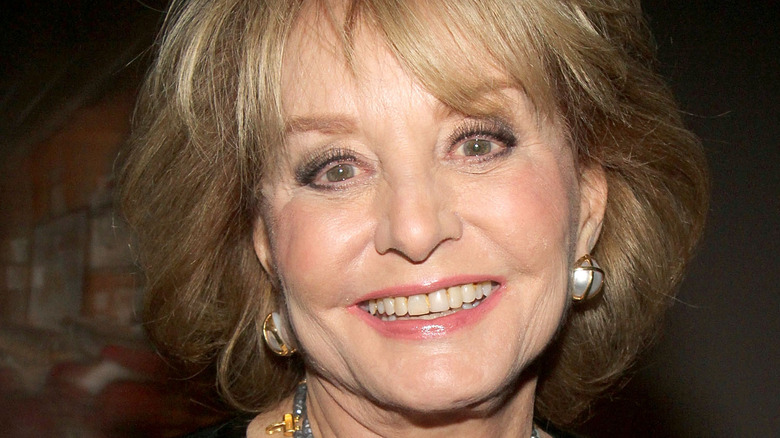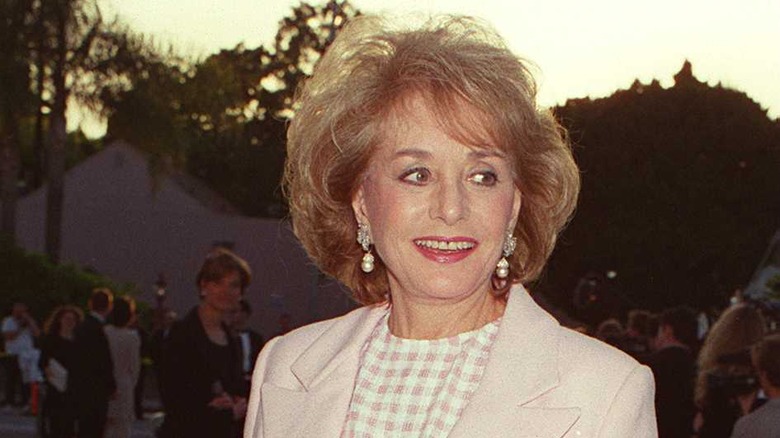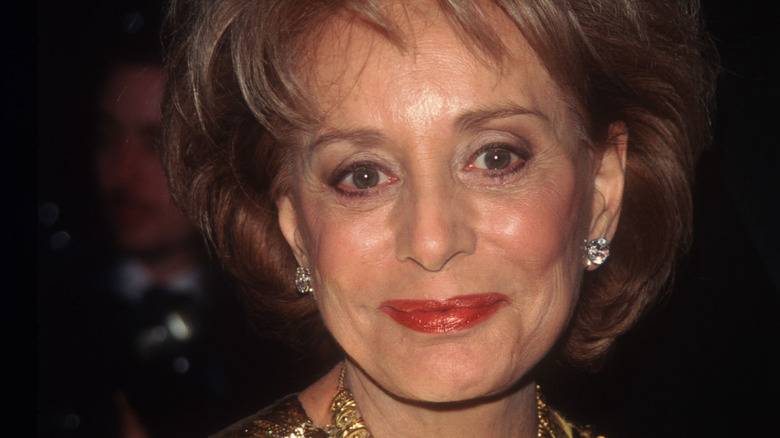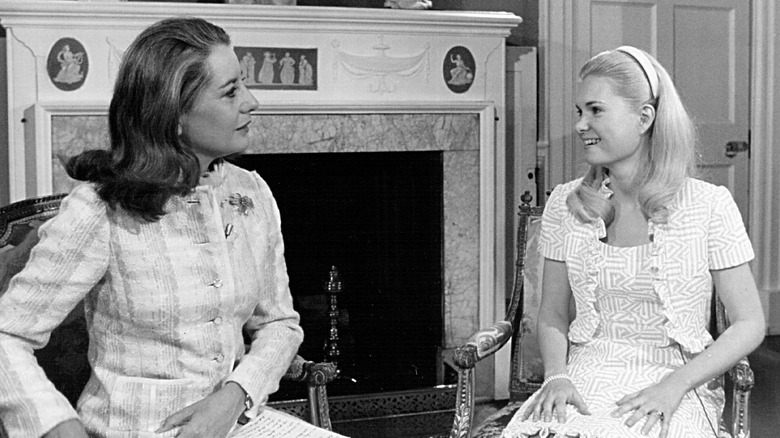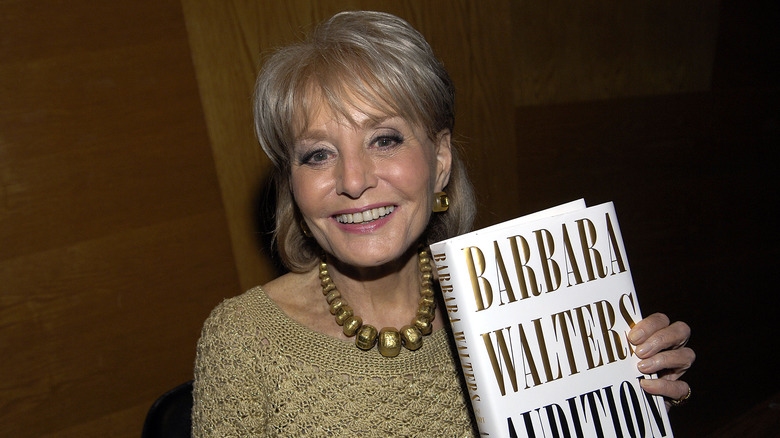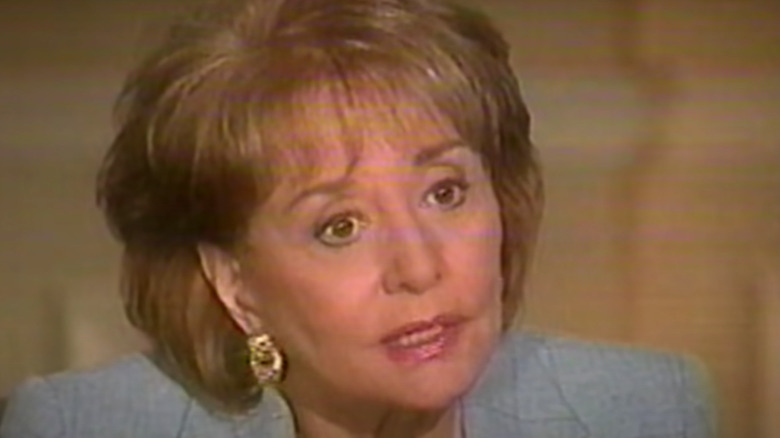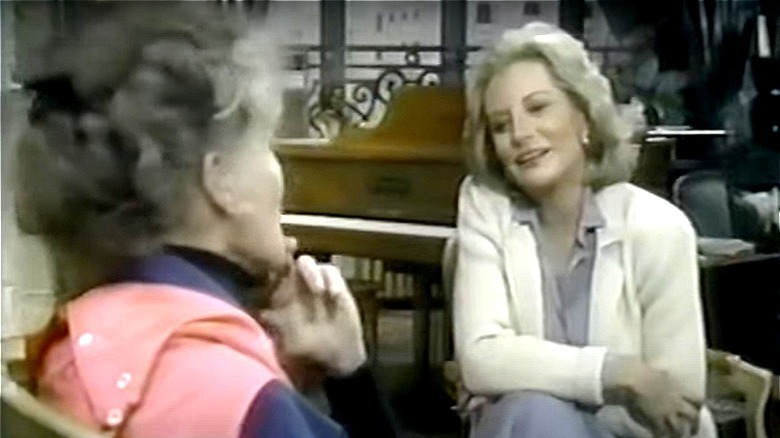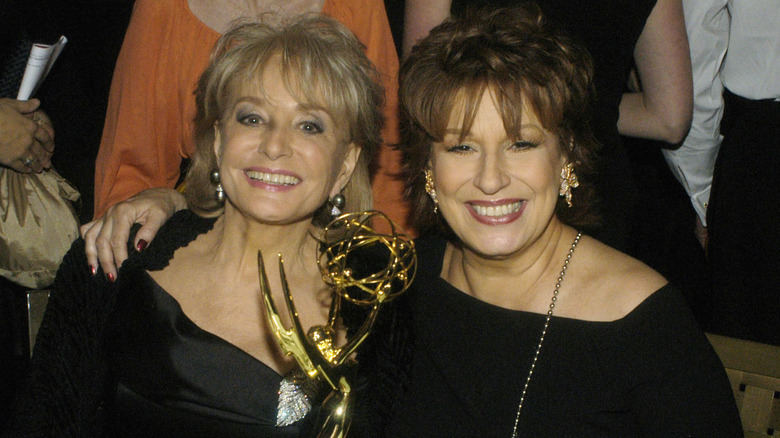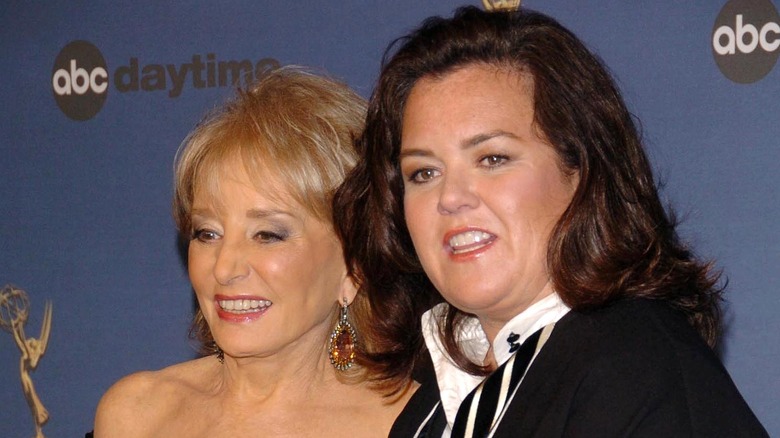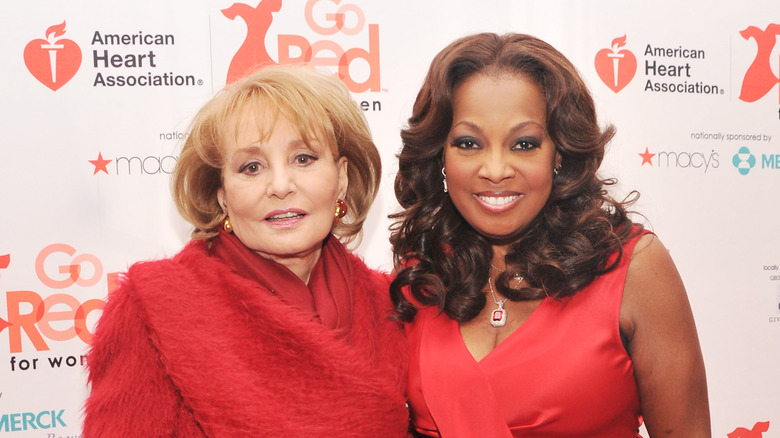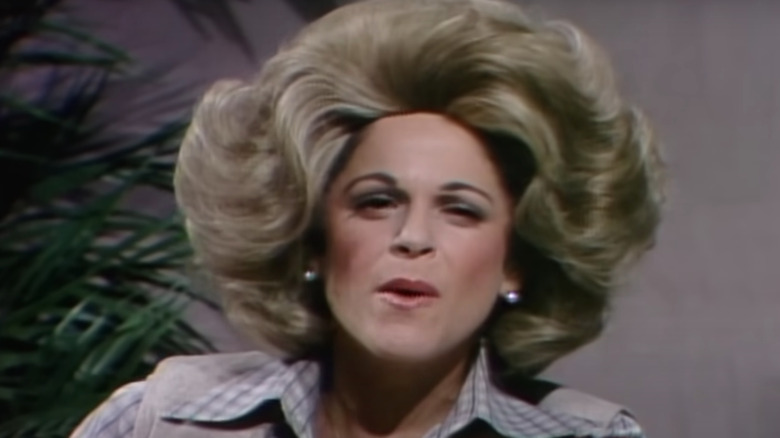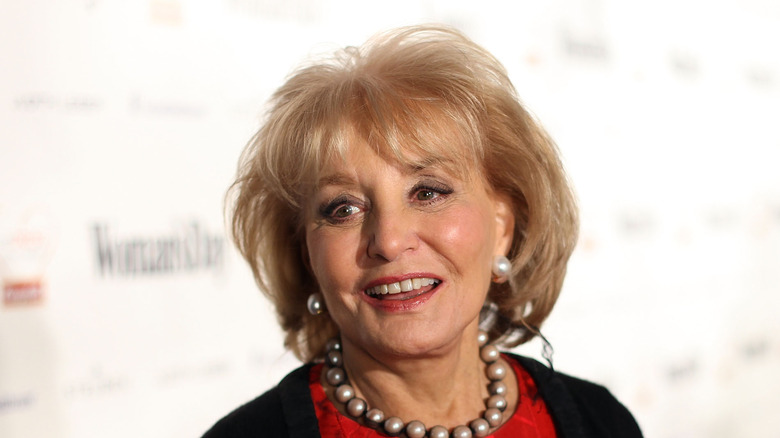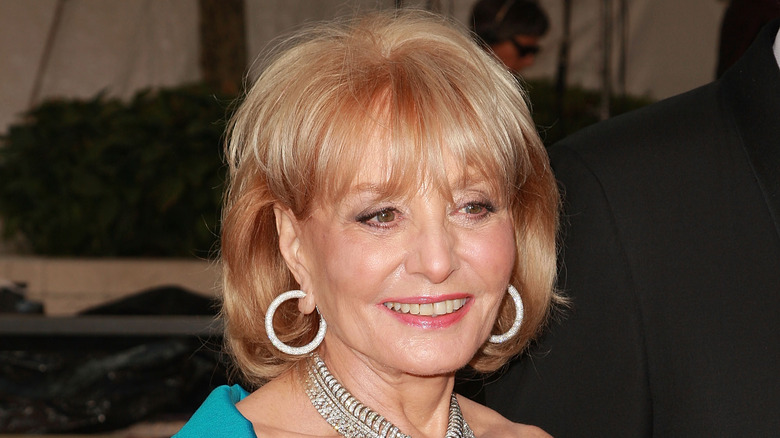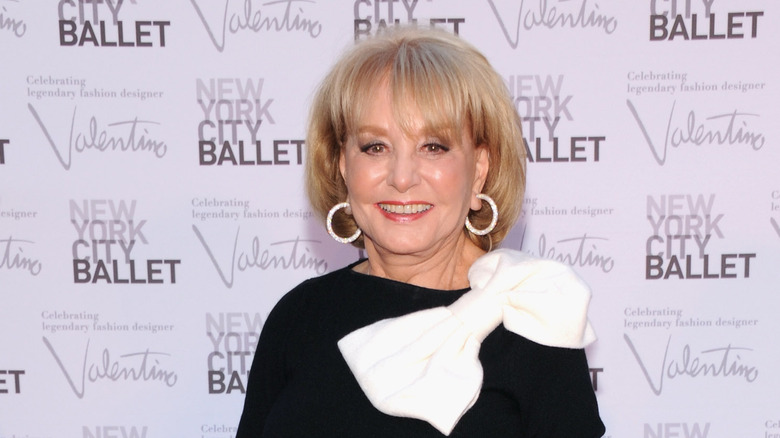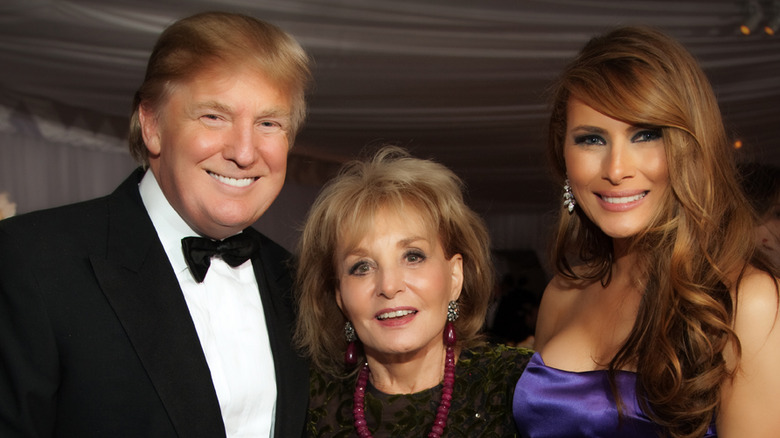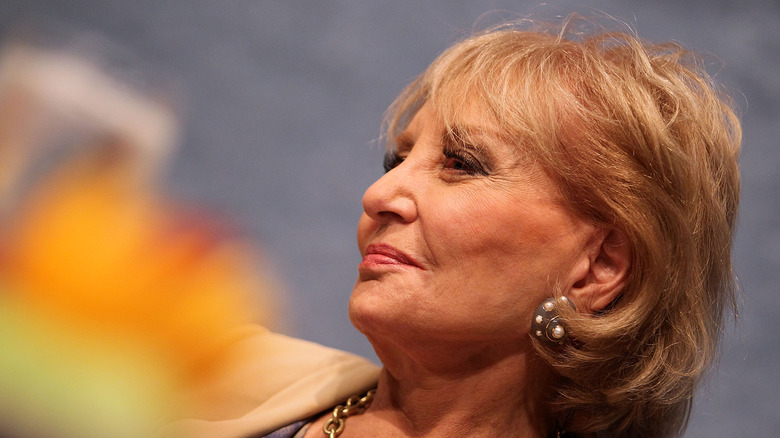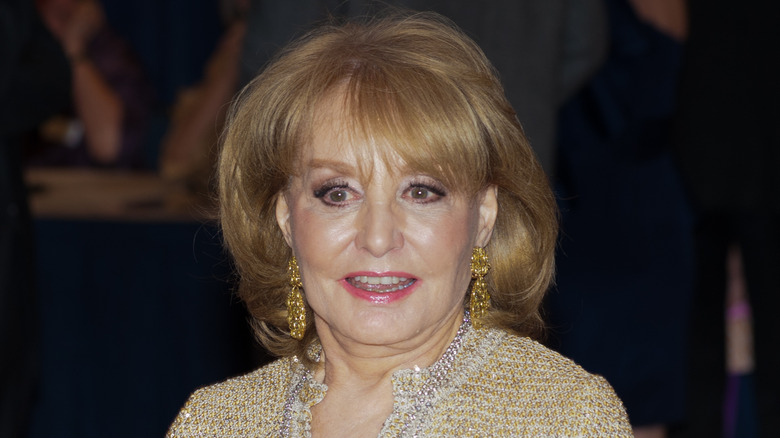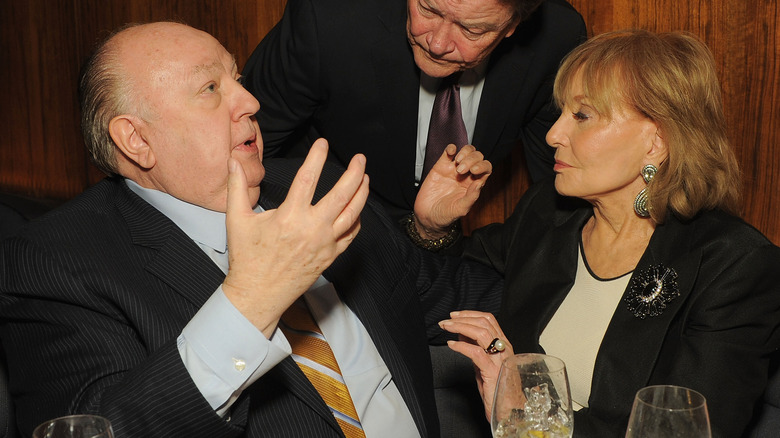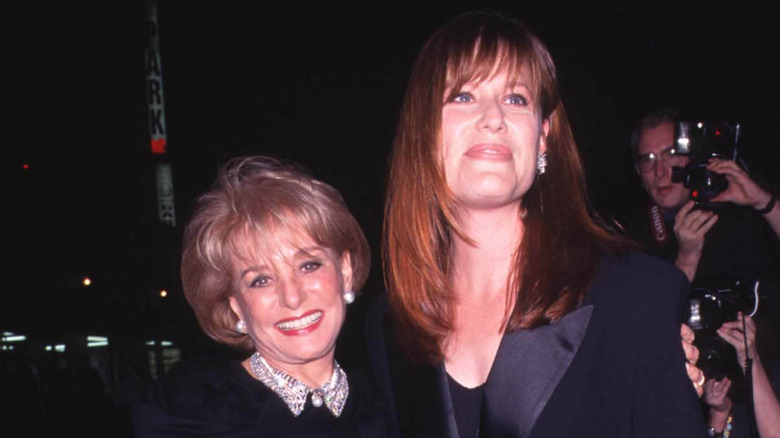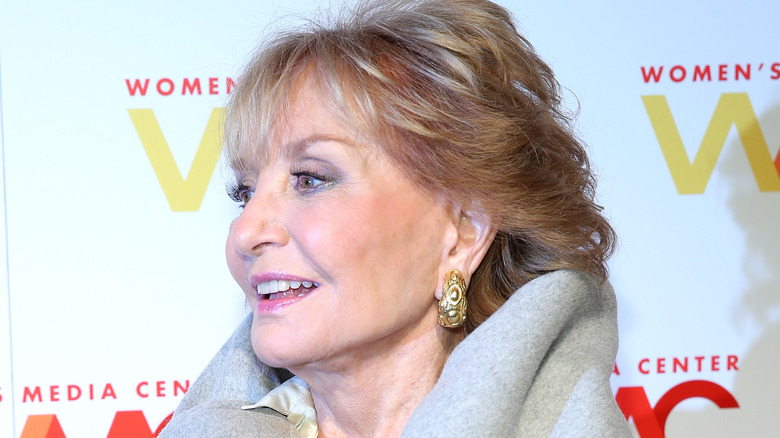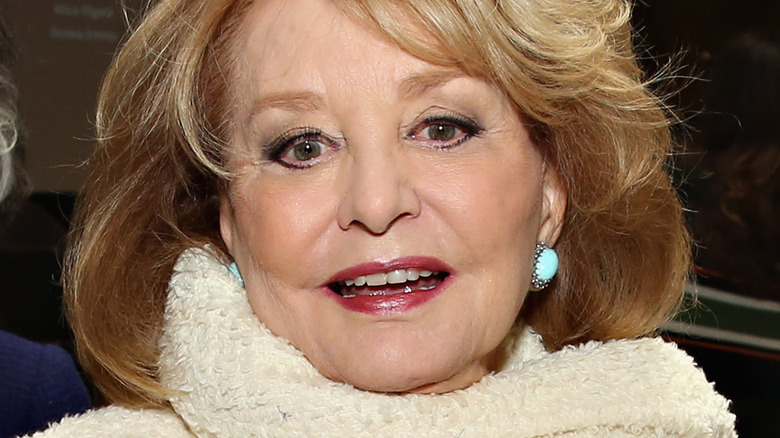Barbara Walters: 20 Facts About The Iconic Journalist
We may receive a commission on purchases made from links.
The following references suicide, sexual assault allegations, child abuse, and addiction.
After six decades in journalism, Barbara Walters was easily one of the most recognizable faces on American T.V. As a host of shows like "The View," "20/20," and "ABC Evening News," Walters interviewed some of the 20th and 21st centuries' biggest celebrities and most influential political figures, including every sitting U.S. president starting with Richard Nixon. She has been credited as a pioneer in the field of journalism, was nominated for over 30 Daytime Emmy awards, and in 2009 she received a Lifetime Achievement Award at the 30th Annual News and Documentary Emmy Awards.
Walters died on December 30, 2022, leaving behind a legacy of history-making, exasperation, and inspiration. Per CNN, her spokesperson Cindi Berger said of her passing: "Barbara Walters passed away peacefully in her home surrounded by loved ones. She lived her life with no regrets. She was a trailblazer not only for female journalists but for all women." Still, the fact remains that Walters lived quite a life, read on to learn more about this iconic journalist's career and life.
Her father was in show business (sort of)
Barbara Walters was born in 1929 to Dena and Lou Walters in Boston. Lou Walters, a booking agent who then became a nightclub owner, had a toe in show business, which may have set the stage for his daughter's later success.
Lou established himself by founding Latin Quarter, a chain of famous nightclubs. The first opened in Boston, then he took it to Miami Beach and New York City. While she understood why some people might assume having a nightclub impresario for a dad would make for an interesting and fun upbringing, Walters told NPR's "Morning Edition," "I didn't want that. I wanted a normal life. I wanted a daddy who was home."
In her 2008 book "Audition: A Memoir," Walters wrote about how interacting with the showgirls off-stage prepped her for her career as a journalist, noting that it honed her conversation skills and shaped her sense of empathy. "What I did learn, at this young age, was that behind these fantasy figures were real people. They may have been glamorous onstage, but I saw them offstage without their costumes and makeup, and they had problems, just like everyone else," she recalled. "As a result I was not in awe, years and years later, when I began doing interviews with big-name stars."
Barbara Walters' father hit hard times
Though Lou Walters seemed to strike gold with his nightclubs, that gold didn't stay. As his nightclub empire's popularity waned and he made some arguably not sound money moves, Barbara Walters' father ended up in a great deal of debt. In "Audition: A Memoir," "The View" host shared that her father borrowed money from anyone who was willing to lend it to him, but it ultimately was not enough to keep the ship afloat. The monetary stress led her father to attempt suicide. While he recovered in the hospital, Barbara recalled, "The vultures descended. Creditors appeared out of the woodwork, some demanding to be paid back the money they'd loaned my father, others demanding to be paid for outstanding bills. ... The days of the penthouses were over."
Again, her father's fate seems to have informed Barbara's own drive; on a 2003 episode of "Dateline," she shared, "I mean we lived in enormous luxury — penthouses, trips to Europe, everything. And then my father lost it all. I mean all. So I really — it wasn't in my head that I had to support my family. I had to support my family."
If you or anyone you know is having suicidal thoughts, please call the National Suicide Prevention Lifeline by dialing 988 or by calling 1-800-273-TALK (8255).
Early on, she dealt with sexism on the job
As a woman who got her start in the world of broadcast journalism in the 1950s and '60s, Barbara Walters was a trailblazer — and that trail she blazed was nothing short of rocky. In "Audition: A Memoir," she looked back on her early days on "Today"... and the less-than-stellar behavior from her male counterpart, Frank McGee. "McGee did not consider 'Today' to be a serious news program. ... To make matters even more unacceptable for frank, he was now being asked to share a desk, not with a male colleague, but with me, a mere woman, whom he couldn't possibly regard as equal." She went on to share that McGee laid down the ground rules that when an important guest appeared on the show, Walters was not allowed to pose a question until her co-host had already asked three.
In 2015, Walters shared advice for other aspiring female journalists with Oprah's Master Class. "Fight the big fights. Don't fight the little fights," she said. "Be the first one in. Be the last one out. Do your homework. Choose your battles. Don't whine, and don't be the one who complains about everything. Fight the big fights."
She wrote an advice book in 1970
Along with "Audition," Barbara Walters authored a guide to the art of conversation titled "How to Talk With Practically Anybody about Practically Anything," which was published in 1970. As Walters shared in her memoir, she learned how to really communicate with people at an early age — and clearly, that skill worked out well for the legendary interviewer. So, it seems only reasonable that she of all people literally wrote the book on how to have a conversation.
Along with giving lessons on the art of talking, Walters is a big proponent of the power of listening, writing in the book, "People bursting with good will and abundance of mental health are charming company; their need for ego-boosting, however, is minimal. People sinking into self-pity and depression are dreary, but they can't get out of it by themselves. So every now and then, just sit there and listen, listen, listen. You're paying your membership dues in the human race."
Barbara Walters made TV history
Throughout her storied career, Barbara Walters broke ground for women in television. Per CNN, in 1976, she became the first female co-anchor ever of a nightly news program, joining "ABC World News Tonight." Her annual salary sat at a cool $1 million, which would be over $5 million in 2022 — clearly, the network understood her star power. She co-anchored the series with Harry Reasoner, but Walters later revealed that the pair did not exactly gel, and her five-year deal with the program ended after just two. Walters then moved on to "20/20."
As her star continued to rise, so did her net worth. As the New York Post reported, she signed a whopping $12 million renewal contract with ABC in 2000. At the time, she was the highest-paid TV journalist. Oh, and the year before that? Her interview with Monica Lewinsky brought in 74 million viewers and broke records and became the highest-rated TV interview at that time.
The infamous question she asked Katharine Hepburn
In 1981, Barbara Walters sat down to interview Hollywood icon Katharine Hepburn. In the introduction to the interview, Walters gushed, "If they said I could only interview one person, over and over again, for the rest of my life, I would pick Katharine Hepburn."
The interview became the stuff of legend, and not just because it was one legend interviewing another legend. While there are a number of moments from the conversation that stuck with audiences, Walters asking "What kind of a tree are you?" may be the standout snippet. This question came after Hepburn casually mentioned becoming a tree. (For the record, she chose an oak tree.) Years later, the famed broadcaster quipped, "Though she was the one to bring up the tree, I couldn't get out from under the branches."
Over the years, the question has morphed into the oft-repeated, "If you were a tree, what kind of tree would you be?" Walters interviewed Hepburn again in 1991 for "20/20," but this time avoided any talk of foliage.
Barbara Walters fought for The View
In 1997, a little show called "The View" premiered. The series, which was created by Barbara Walters, not only has raked in awards, but has helped shape daytime chat programming as we know it.
It's all thanks to Walters' vision. Per Vanity Fair, she pitched the series to the skeptical execs at ABC, and eventually, it all came to fruition. And while it took a little time to get off the ground, Walters stuck to her instincts and didn't give up on the series. Original "The View" co-host Joy Behar told the magazine, "She had a lot of clout at that time with the network. I think she singlehandedly kept that show on the air until it caught on."
In 2010, Walters was a part of history yet again when then-President Barack Obama visited the show, marking the first time in history a president appeared on a daytime television talk show.
She was in the middle of the Rosie O'Donnell drama
Despite Barbara Walters' top status at "The View," she still got mixed up in all the drama surrounding co-host Rosie O'Donnell's tenure on the show. O'Donnell originally appeared on "The View" from 2006 until her now-legendary fight with Elisabeth Hasselback in 2007, which seemed to prompt her departure a month later.
Walters was the one to bring O'Donnell aboard, and she always stood by that casting choice — even if it came with ups and downs. Of that particular era of "The View," Walters wrote in "Audition," "It was like a roller-coaster ride or a bumpy trip on a fast-moving bus."
In May 2014, Walters retired from "The View." Two months later, O'Donnell returned to the panel, and rumors of a feud with Whoopi Goldberg surfaced. And even though she was no longer at "The View" desk, she couldn't totally get away from "The View" discourse. As she said in Vanity Fair in 2015, "I think Rosie and Whoopi together was not peaches and cream. And I don't think we needed the two of them together. It was not a combination that I would have thought was a natural." O'Donnell left again in February 2015; Joy Behar told Vanity Fair that the show lacked Walters' ability to "keep a lid on the craziness."
She had some criticisms of Star Jones
While promoting "Audition: A Memoir" in 2008, Barbara Walters had some pretty critical words for Star Jones, her former co-host on "The View." In 2003, rumors spread that Jones had undergone gastric bypass surgery, which she vehemently denied at first, but finally later confirmed.
Of course, that's Jones' prerogative, but apparently, Walters wasn't thrilled with how it all played out. Per ABC News, she told Oprah Winfrey in 2008, "[Jones] decided to have a gastric bypass operation, but then she decided not to tell anybody. Then we had to lie on the set every day because she said it was portion control and Pilates. Well, we knew it wasn't portion control and Pilates." Understandably, Walters' comments did not sit well with Jones. She said in a statement to Us Weekly (via ABC News), "It is a sad day when an icon like Barbara Walters, in the sunset of her life, is ... speaking negatively against me all for the sake of selling a book."
While they had their differences, there was still a great deal of respect between Walters and Jones. When news of Walters' death broke in December 2022, Jones tweeted, "I owe Barbara Walters more than I could ever repay. Rest well sister...mother...friend...colleague...mentor."
She was conflicted about her SNL impressions
Back in the 1970s, "Saturday Night Live" cast member Gilda Radner debuted a running impression of Walters, the infamous "Baba Wawa." At first, Walters was hurt by the impersonation, writing in "Audition," "People started calling me Baba Wawa behind my back, and even to my face...I was so depressed at the time, I felt they were laughing at me rather than at Gilda's characterization of me." However, she later ran into Radner and acknowledged that the impression was "brilliant."
In a tribute to Radner years later, Walters again admitted she wasn't a fan of the bit at the start, but it did grow on her. And yes, she did have some notes. "I don't talk that way, and I do pronounce my Rs," she quipped.
Fellow "SNL" legend Cheri Oteri also had a memorable Barbara Walters impression. And it seems safe to say Walters was into her imitation, as she invited Oteri to interview her on "The View" in character. The day after Walters died, Oteri appeared on CNN's New Year's Eve special and talked about the venerated host's legacy. "To have her blessing and be on 'The View,' I was just in awe," Oteri gushed.
Barbara Walters was married four times
Barbara Walters is no stranger to matrimony. In 1955, she wed executive Robert Henry Katz. After that didn't work out, she went on to marry theater producer Lee Guber in 1963. The two adopted a daughter, Jacqueline Guber. Five years after her second marriage ended, Walters tied the knot with TV producer Merv Adelson. They split in 1984, had a second wedding a couple years later, and called the whole thing off yet again in 1992. Walters' second wedding to Adelson was her final wedding.
In the 2014 ABC News special "Barbara Walters: Her Story," Walters suggested the whole "'til death do us part" thing just did not click for her. "I don't think that I was very good at marriage," she said. "It may be that my career was just too important. It may have been that I was a difficult person to be married to, and I just seem to be better alone. I'm not lonely, I'm alone."
She had an affair with a married senator
In "Audition," Barbara Walters opened up about a number of pieces of her story that she'd previously kept under wraps, including her affair with married Massachusetts Senator Edward Brooke. Per The New York Times, Walters said he was one of the "most fascinating, sexiest men I ever met." Their clandestine relationship took place in the 1970s and went on for two years.
Brooke — who broke ground as the first Black member of the U.S. Senate elected by popular vote – told his wife about the affair in the hopes of getting a divorce. However, both Brooke and Walters ultimately figured it'd be best to call the whole thing off for the sake of their respective careers. "I slowly began asking myself if we could ever be married. Would such a marriage destroy his career? Would it destroy mine?" she wrote.
The affair was through before Brooke failed to win re-election for a third term in 1978. Per ABC News, Walters told Oprah Winfrey in 2008, "He was a wonderful man and a wonderful senator. ... I have always felt that I perhaps ruined his future. I regret that he didn't get re-elected. So if you ask me if I regret it, yes."
Barbara Walters was close with Roy Cohn
The late lawyer (and Donald Trump mentor) Roy Cohn earned a reputation as one of the 20th century's most controversial and hated attorneys. Regardless, Walters had a friendship with Cohn, and in her memoir noted that he once got a warrant for her father's arrest dismissed. Although Cohn was gay (though not out), she was seen around town his arm until his death from AIDS in 1986, and Cohn would even call Walters his fiancee. Per Vanity Fair, legendary gossip columnist Liz Smith once said, "Of course, it was absurd, but Barbara put up with it." Walters also acted as a character witness in Cohn's 1986 disbarment hearing.
Walters caught flack over the years for her connection to Cohn, but she always defended their relationship. "I was his claim to heterosexuality," she told the San Francisco Chronicle. "He never said that he was gay, he never admitted to me that he had AIDS. He was a very complicated man. He died, alone, up to his ears in debt. He had been disbarred and he was hated. And I might have thought the same way, but he did something when my father was in trouble, [and] I never forgot that."
She rubbed elbows with controversial political figures
Along with her relationship with Roy Cohn, Barbara Walters has faced criticism for cozying up to political figures like Fidel Castro (the subject of a famous 1977 interview which earned Walters death threats), Syrian dictator Bashar al-Assad (whose aide she tried to help obtain a CNN internship and admission to Columbia University), and former President Donald Trump.
Walters' friendship with Trump especially drove a wedge between Walters and fellow "The View" host Rosie O'Donnell. After O'Donnell and Trump's very public feud kicked into high gear in 2006, Walters and O'Donnell had serious tension behind the scenes. "We had it out in the dressing room about things that were way to personal to bring up, and I brought them up," O'Donnell shared on "Hot Takes & Deep Dives in 2021." "It was a rocky, rocky place that we were in, but we got through it."
Barbara Walters' greatest personal regret
In a 2013 interview with Piers Morgan, Barbara Walters sat in the hot seat for a change and opened up about her own life. "I regret not having more children. I would have loved to have had a bigger family," she told Morgan. "I have one daughter. I don't have brothers and sisters."
The following year, Walters touched on this sentiment again for an ABC News special titled "Barbara Walters: Her Story." The veteran broadcast journalist said she regretted how much her professional life had cut into her time with her daughter. "You know, on your deathbed, are you going to say, 'I wish I spent more time in the office?' No. You'll say, 'I wish I spent more time with my family,' and I do feel that way. I wish I had spent more time with my Jackie," she shared.
As someone who not only worked to make a name for herself in such a cutthroat industry, but was the first woman to become a bona fide star of the TV news world, finding work-life balance required a great deal of work. As she said in a 1979 interview with Parents magazine (via The Washington Post), "All of that may be possible, but it's not easy – it takes a lot of juggling, a lot of guilt, a lot of pulling in different directions."
A number of her remarks raised eyebrows
Despite her undeniably storied career, in addition to bad press around certain friends she's kept, Barbara Walters hasn't always been popular in her handling of controversial issues.
Over the years, Walters caught flack for arguably going too far with questions or taking a polarizing stance. Some of her more questionable moments include defending Woody Allen after he was accused of molesting his daughter, shutting down former child actor Corey Feldman on "The View" when he attempted to speak about child abuse in Hollywood, pushing pop star Ricky Martin to open up about his sexuality, and shading Katy Perry as the singer's marriage fell apart (okay, maybe that last one wasn't quite so controversial).
All that said, Walters wasn't one to refuse to admit she stepped in it. As she told the Toronto Star in 2010, "In 2000, I pushed Ricky Martin very hard to admit if he was gay or not, and the way he refused to do it made everyone decide that he was. A lot of people say that destroyed his career, and when I think back on it now I feel it was an inappropriate question."
If you or someone you know may be the victim of child abuse, please contact the Childhelp National Child Abuse Hotline at 1-800-4-A-Child (1-800-422-4453) or contact their live chat services.
If you or anyone you know has been a victim of sexual assault, help is available. Visit the Rape, Abuse & Incest National Network website or contact RAINN's National Helpline at 1-800-656-HOPE (4673).
She was a close friend of Roger Ailes
It was well-known that Barbara Walters was close to Roger Ailes. More on their friendship was revealed when "Roger Ailes: Off Camera," Zev Chafet's biography on the disgraced Fox News CEO, came out. "I dated Barbara a couple of times, or took her out as an escort, but we never had an affair," Ailes told Chafet (via AdWeek). "We probably could have at some point, but we were always married or between marriages or talking about marrying someone. We never got beyond that point, but we trusted one another, and we still do."
According to The New Yorker, some of the details about Ailes included in Joe McGinniss' book "The Selling of the President 1968" did not sit right with the legendary broadcast journalist. McGinniss told the outlet that Walters even called him out publicly. "She thinks I treated him unfairly," McGinniss said. Regardless, the New Yorker notes that Ailes apparently was on board with the book.
Her daughter isn't a fan of the limelight
Barbara Walters' only child, Jacqueline Guber, has always preferred a life away from the spotlight. "Jackie has found it difficult, all her life, because she wants to be anonymous, she just doesn't like to be a celebrity," Walters shared on ABC News' 2014 special "Barbara Walters: Her Story." "She may be the only one in the world who doesn't like to be a celebrity."
Even so, some of Danforth's personal matters have been made public. Danforth struggled with addiction as a kid, and once even ran away from home. As Walters helped her daughter through these tribulations, she also tried to make sure Danforth was protected from the press. "I did not want to read about Jackie in a tabloid," she said on "Dateline" in 2002. "I just knew that for this child, who was struggling enough to be her own person and not be Barbara Walters' daughter, to have this be headlines."
Unfortunately, Danforth made headlines in 2013 when she was arrested for DUI in Florida. According to TMZ, cops nabbed Danforth after she and her passenger were found sitting in a car that happened to be parked in the middle of a highway. Danforth's BAC was reportedly over twice the legal limit.
If you or anyone you know needs help with addiction issues, help is available. Visit the Substance Abuse and Mental Health Services Administration website or contact SAMHSA's National Helpline at 1-800-662-HELP (4357).
Barbara Walters was diagnosed with dementia
Though few details are available about when Barbara Walters was diagnosed with dementia, her daughter, Jaqueline Gruber, sold Walters' condo in 2018 following the diagnosis, according to the New York Post. Walters had transferred the Naples, Florida, property over to Gruber two years after she had first purchased the home. "It was supposed to be her place to retreat, but unfortunately her health deteriorated pretty quickly in the last few years and we just knew she would best be accommodated in New York," a source told the outlet.
In her final years, Walters reportedly refused to see any visitors. In September 2022 an insider told Radar that the TV star was spending much of her days napping due to exhaustion. "Barbara is fading a little more every day," another Radar source said. "She's close to the end and her team is scrambling to manage affairs just the way Barbara would want them." Radar reported in 2019 that Walters was not receiving visitors even for her 90th birthday.
Her last public appearance was in 2016
In the last years of her life, Barbara Walters stayed away from the spotlight. In 2014, she stepped down from her venerated post on "The View," and the following year, she sat down with Donald Trump for what would be her last on-camera interview. Walters' final public appearance happened in 2016 when she was spotted at the opening night production of "The Father" on Broadway, per Page Six. Just a short while later the public would find out that Walters had been diagnosed with dementia — which is also, in part, the premise of "The Father." Before attending the show Walters also went to a luncheon at the New York Public Library the day before, noted the outlet.
Even Walters' online public persona disappeared after 2016. Her final tweet (that wasn't a retweet) happened on September 25, 2017. In her tweet, she sent out a thank you to those who wished her a happy birthday on her 88th trip around the sun. "I appreciate everyone who reached out on my special day," Walters wrote.

